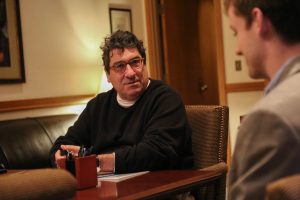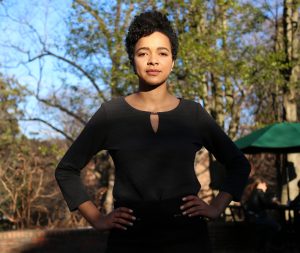The decisions a chancellor has to make were never the easy ones. As Vanderbilt Chancellor Nicholas Zeppos told me, “if everyone agreed, the decisions wouldn’t get to me.”
Nevertheless, I wondered if the election of Donald Trump had changed things. The Chancellor must now cope with events he couldn’t have foreseen: possible mass deportations and Muslim registries, a travel ban on seven countries from which the university draws students, and an appalled campus pleading for him to take a stand. He was hired to be Chancellor, not a politician. In the age of Trump, does he now have to be both?
I met with Chancellor Zeppos to ask him. On the day of our meeting he was in high spirits, although it is my impression that he nearly always is. He repeatedly offered me refreshments. He joked with Claire, VPR’s photographer (“Do you want me to sit in my official chair with the high back? It’s both old and new—kind of like Vanderbilt”). When we finally got down to it, I asked him about his recent “political” statements regarding Sanctuary Campuses and the executive order.
“I find it incorrect for people to say ‘you’re acting politically,’” he said. “I’m standing up for what the university stands for. I do it on rare occasions. And I’ll continue to do it. I’ve done it in the past and I’ll do it in the future.”
The Chancellor says that his statements, as well as his decision to join 16 peer institutions in filing an amicus brief against the executive order, were not motivated by politics but by values—Vanderbilt’s values, America’s values, and, most of all, the value of education—all of which he worries are under threat. You’d expect the leader of a university to hold strong beliefs on education, but for Chancellor Zeppos an education isn’t just valuable; it’s the key to everything, from his own life to America’s standing in the world.
At last year’s commencement and again in his Sanctuary Campus statement, Chancellor Zeppos told the story of his paternal grandfather, John Zeppos, who immigrated to the United States from Greece in the 1920s. His first attempt at citizenship was denied because he was deemed ignorant of American government. His second attempt was accepted because two men, a merchant and a molder, signed his citizenship petition as witnesses, testifying to his “good moral character.” For his own signature, his grandfather had scrawled an X. Recently seeing the petition for the first time, Zeppos realized that his grandfather had been illiterate. He, the leader of an elite university, was only two generations removed from an illiterate Greek immigrant, someone who had once been denied citizenship and eventually gained it only through the goodwill of others. Some students, upon reading this story in Zeppos’ November 28th statement, discounted it as a diversion in lieu of taking an actual stand, but I have no doubt the story is genuinely meaningful for the Chancellor. “It’s hard,” he says, “to put [the petition] in a box in your closet and not think about it when you do your job.”

For him, that petition was a testament to the value of education. Education allowed him to live beyond the world of basic survival and in the world of ideas, something his grandfather, in his short, hard life, never got to do. It was also a lesson in goodwill, especially towards “the Other.” Without that goodwill, John Zeppos and his family, as well as so many other immigrant families, would never have realized their American dream. Without it, Nicholas Zeppos wouldn’t be here today.
In Zeppos’ eyes, education is not just important to the success of the individual. It’s vital to the health and standing of the country. “We can argue about how America is ‘Number One.’ But there’s no doubt American research and American [universities] are the best in the world.” It is America’s values—”freedom, scientific rigor, innovation, entrepreneurship”—that have enabled its universities to thrive. The Chancellor recounted a conversation he had with the Crown Prince of Abu Dhabi, a country with massive oil reserves. According to the Chancellor, the Crown Prince revealed to him that what he truly wanted, but what had thus far eluded him, was a university system like that in the U.S. He wanted the humanities and liberal arts, for students to study poetry and political science. Can you imagine, the Crown Prince asked, what it’s like to have all of these resources but no great universities? It was a profound lesson. “You can’t buy a great university,” the Chancellor told me. “Universities grow out of the values in the soil and the freedoms. We need to protect that.”
Right now everyone wants to come here, Zeppos said, taking a handful of pens, which he said represented the world’s best students, and placing them on a coaster, representing American universities. We benefit from that. Those students improve education and research. Attracting the best and brightest from around the world ensures that our elite colleges remain elite. Zeppos warns that, if something prevents or dissuades those students from coming, like a travel ban, then they’ll go somewhere else. This will lead to a decline in American universities and, before long, the brightest American students will start looking elsewhere too. And, while those students have the freedom to seek greener pastures, the universities do not. “If I’m a company and I don’t like the local business climate, what do I do? I move. But do we move? No. We never move. We’re always here.” The Chancellor defends American values because, he says, it is those values on which the quality and stature of his university depend.
There are those who think the Chancellor has not gone far enough in his defense of liberal values. Ariana Fowler, the President of Vanderbilt Student Government, felt the Chancellor’s January 29th statement regarding the executive order, which did not explicitly condemn it, was inadequate. She suspected that Zeppos may not have authored the statement, which was uncharacteristic in its brevity. Zeppos said that he did write it, and that he writes almost everything issued in his name.
Fowler quickly wrote her own statement and emailed it to all undergraduate students. The message, which, according to her, was well received, was not only a broad condemnation of the order, but an instruction manual and a bold attempt to add meat to the university’s, and the Chancellor’s, official statement. Fowler, a 20-year-old senior who acts with the confidence and decisiveness of a battlefield general, had no problem steering VSG beyond its traditional role of event planning and into politics. “The Executive Order was more than just a political move,” she said. “it was an immoral and inhumane one—certainly in its execution. When anything is discriminatory or harmful to students, be it political or not, I believe VSG has a role to speak out.”

Others also wish the Chancellor would be more forceful. In November, the VSG senate overwhelmingly voted to recommend that Vanderbilt be labeled a “Sanctuary Campus,” and some students I spoke to were angry when Chancellor Zeppos declined to do so. But in this political environment, with congressional Republicans threatening to cut funding to schools that label themselves sanctuaries, the Chancellor argued for practicality over symbolism. “What does it actually mean to be a sanctuary campus?” he asked me, letting the question hang in the air. His implied answer: legally, nothing. The university is not going to cooperate in the deportation or registration of any of its students, he assured me, but it’s also not going to paint a bullseye on itself. Doing so might put students at more risk, not less.
Throughout my conversation with the Chancellor—most of it concerning values and the importance of education—I wondered what he personally thinks of all this. In addition to being a constitutional scholar and former Justice Department lawyer, Zeppos is politically active and has contributed to candidates on both sides of the aisle, from Barack Obama and Jim Cooper to Bob Corker and Rick Perry. (See for yourself—it’s all public record.) When I asked for his thoughts on the constitutionality of the executive order, he played coy.
“Let’s just say that it happens oddly to fall in a space that I know a fair amount about,” he said, chuckling to himself. “I think there are some things that are problematic from a legal point of view. You know it’s not my job, because I don’t sit on the Supreme Court. It’s not my job to advise people, but it’s fun for me because I get to put my constitutional lawyer hat on.”
In talking with the Chancellor I gained a deeper understanding about the nature of his job. Whereas it is the VSG President’s job to advocate for Vanderbilt’s undergraduates, it is the Chancellor’s job to advocate for the whole Vanderbilt community. Liberals on campus, having recently shrugged off Vanderbilt’s reputation for political apathy, want a champion, someone who will preach progressivism from the rooftops of Buttrick, Calhoun, and Cole. They forget that the job of the chancellor is, primarily, that of a diplomat. He must serve diverse factions not only within the student body but also within the faculty, staff, alumni, the board, and the coalition of peer universities that rely on each other. Activists want boldness. Yet, in this environment of anti-intellectualism and anti-elitism, where state and federal lawmakers, and the Trumpian populists running the executive branch, would relish any opportunity to stick it to an ‘ivory tower’ like Vanderbilt, the Chancellor is perhaps wise to pursue a quieter strategy.
In the age of Trump, resistance must take many forms: quiet, loud, from both inside and outside the system. It must be tailored to its specific goal. For Chancellor Nicholas Zeppos, that means fighting for research funding, reaffirming the university’s, and the country’s, values, and occasionally speaking out when he feels those values need protection. The Chancellor says that the future of America rests on the strength of its universities, which will remain strong as long as they stay true to core American values. He has a strategy to keep Vanderbilt true, and strong, in these unique times. For the sake of our university, and our country, I hope he succeeds.








